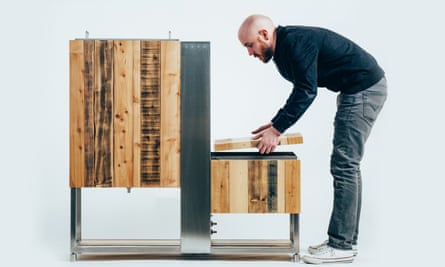Brothers Bill and Jim Mitchell shared a passion for homebrewed beer but, when they shared a recipe, the pair could never seem to get the same result. Although Jim’s Angry Amber was his best beer, Bill could not replicate it even though their brewing systems were largely identical.
It’s a common problem for home brewers. Producing a consistent-tasting batch of beer depends on the fickle brewing process, where a subtle change involving the barley and hops can result in very different products. Bill, a former Microsoft executive, set out to apply science to the homebrewing process.
“We said that the end goal is to build an every-person countertop craft beer machine that can brew just like the professional breweries do and give all the level of process control and repeatability to get a great tasting craft beer batch in your home,” he said.
The result, they claim, is the Pico, a machine with a passing resemblance to a microwave. It brews 5-litre batches of beers after the exact ingredients are fed via pods into the device much like coffee being loaded into a Nespresso machine.
The 14kg machine works by loading water with PicoPaks of ingredients, and then brewed for about two hours. The beer recipes come from various breweries but the bitterness, thickness and alcohol volume can be adjusted at home. After the brewing process, the beer is transferred to a keg to ferment for about a week.
The aim, says Seattle-based Mitchell, is to engage amateurs by brewing consistent beer each and every time by eliminating the frequent possibility of “bad batches”.
“You don’t know what went wrong, you can’t track back. If you are at all scientific, it drives you nuts and usually for most people that is it. You just wasted eight hours, a fair amount of money. You thought you did everything right and you produce a bad batch. There are just so many ways that a batch could go bad.”About 2,000 of the machines have been preordered and are expected to ship from April. The early bird price was $500 (£340) and this is expected to rise to $999 at retail. The PicoPaks are available from the company’s website, among them pale ales, porter and a strong English bitter.

Another aim is to make beers from different parts of the world available and customisable. “If you tasted Rogue Dead Guy Ale from one of the popular Oregon breweries, it is a great beer. It is pretty high alcohol at 8% and if you really enjoy that beer, you are going to have a hard time enjoying more than a couple of pints of it at a time unless you have a pretty big liver. But if you were to scale it down and turn it into a session beer and crank it down to perhaps 4% alcohol, then it is a whole different beer.”
Costs for the different pods vary from $18 to $30, meaning substantial savings for high-end beers and minor savings for mainstream drinks, says Mitchell. “If you go to a commercial chain and you buy a Heineken mini keg, those cost about $19 or $20 and if you are making some style of beer which is very like that the PicoPak would probably cost you $16 or $17,” he says.
The growing interest in craft beers – Mitchell says there were 1m homebrewers in the US when they started their company PicoBrew in 2010 – has created a demand for niche beers from around the world but not necessarily any demand for the intricate system of sourcing and measuring hops and grains out, he says.

In Belfast, Northern Ireland, where many pubs are tied to suppliers and their particular range of drinks, the limited selection of craft beers on offer led to the creation of Brewbot. The 4ft square brewing machine made from stainless steel and wood produces 30 litres of beer each time. The four founders aim to sell the device to bars, restaurants and offices to create and brew their own beer. Existing brewers have also bought the machines to make test batches of experimental recipes while some companies station them in offices for staff to enjoy, adding another layer of staff perks now synonymous with tech firms. Ingredients can be ordered and recipes downloaded. If they prefer, homebrewers can go off-piste and create their own blends.
Brewbotting a batch of beer can take between four and six hours. The beer then ferments elsewhere for an average of between two to four weeks. The Brewbot can then be used to make further batches of 90 bottles. An app notifies the user of the various different stages of the brewing process after the recipe is chosen. Since the machine is not totally autonomous, the app tells the user when they need to step in.
The Belfast-based firm, has sold 150 units so far to various bars, restaurants and companies as well as breweries. Brewbot chief executive, Chris McClelland, says the machines allow restaurants to experiment with new types of beer, just as cafes dream up specific coffee recipes by mixing different bean. “It allows chefs to apply a chef mentality to brewing,” he says.
At £6,900, the machine is beyond the budget of most home brewers and is aimed more at a commercial market. The end price of a beer from the machine depends on factors such as the costs of shelf space in a restaurant or how long it takes to brew, McClelland says.
Asked if it isn’t easier to just buy a crate of bottled beer, he replies: “Do people have that attitude with their food?”

Comments (…)
Sign in or create your Guardian account to join the discussion